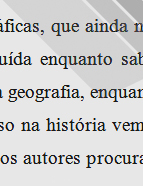

................................
As his colleague and life partner Suzanne Daveau notes, Orlando Ribeiro “never felt any contradiction in his dual training as a naturalist and historian” (Ribeiro, Opúsculos III, p. 8). On the contrary, he perceived it as a kind of “conspiracy between Nature and History” (Ribeiro, O Ensino, p. 11). In fact, in Orlando Ribeiro’s work, there is a wise interplay between history and geography, which mutually support and influence each other. It may not be entirely accurate to speak of interdisciplinarity—a term he sometimes uses in quotation marks. This is because, in his thinking, methods and concepts from different fields are not separated or set against each other, even if they appear intertwined. They are, simultaneously, one and the same. His historical reasoning does not seek support from geography as it is already inherently geographical, and his geographical methodology employs history seamlessly. To use his words: “By observing its complex realities, the geographer cannot help but see through time, places, people, and things. I believe, moreover, that history, within the scope of the human sciences, is both a core and a pathway to knowledge” (Ribeiro, Portugal, p. XVI).
Finally established at the Faculty of Arts in Lisbon, Orlando Ribeiro founded the Centre for Geographical Studies, initiating the training process for geographers, which led to the formation of an outstanding group of researchers. Historical analysis was always a priority, beyond the influence of its main founder, with contributions from Raquel Soeiro de Brito, Ilídio do Amaral, and later Carminda Cavaco, António de Brum Ferreira, Carlos Alberto Medeiros, Jorge Gaspar, and many others. In the 1960s, the team benefited from the remarkable addition of Suzanne Daveau, who was keenly interested in history and ancient literature, fields she continues to study today, and as a sharp observer, she began her exemplary work on Portugal in 1962 and has steadily expanded her work since 1966. (Garcia, “Suzanne”, p. 23).
